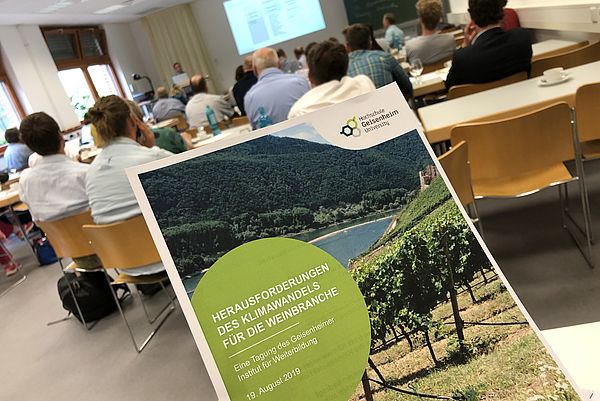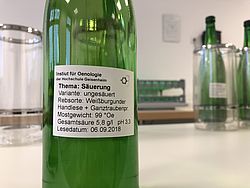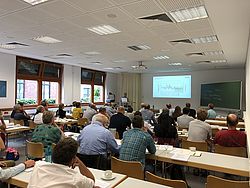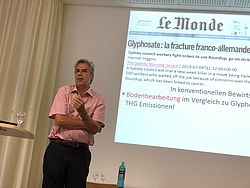Climate change poses many problems for vintners; not only rising temperatures but also increasing numbers of extreme weather. In a conference organized by the Geisenheim Institute of Continuing Education, scientists from Hochschule Geisenheim University presented practical strategies for vintners in supporting grape health and wine quality.
More frequent high rainfall and longer dry periods can lead to the spread of new and established pests, while increasing temperatures during the ripening period can alter the berry composition. In order to be able to produce typical wines of the highest possible quality in the future, winegrowers have to make adjustments at various points, from the selection of varieties to soil cultivation, irrigation, cultivation work and crop protection to enological strategies such as acid management.
Changing climatic conditions with increasingly longer dry phases cause water shortage leading to a nitrogen deficiency in the soil during the growing period, which negatively affects fermentation and, thus, aroma development. Sudden increases in nitrogen availability for the vine due to heavy rainfall can be detrimental to the health of the grapes. Adjustments in soil management and fertilisation timing and intensity will also be necessary given an increase in nitrate levels in groundwater, according to Prof. Otmar Löhnertz, Head of the Department of Soil Science and Plant Nutrition.
Plant protection is showing an increase in years with severe Peronospora soil infections, and temperature-related earlier budbreak faster flowering could favor the development of botrytis, added Dipl.-Ing. Ottmar Baus from the Department of Crop Protection. Even if influence by weather-related factors is limited, winegrowers should always be aiming for the optimum balance between preventive plant protection measures and good resistance management. The time of application is more critical than the choice of product, and keeping a close eye on the vines is crucial.
Prof. Joachim Schmid from the Department of Grapevine Breeding spoke about the potential of high genetic diversity as preparation for climatic changes, explaining the possibilities of systematic clone selection for the breeding of rot-resistant varieties with reliable yield potential and high wine quality.
The challenges faced in the cellar were highlighted by Dr. Matthias Schmitt and Dr. Maximilian Freund from the Department of Enology. Schmitt underlined the fact that increasing temperatures mean increasing alcohol content, stuck fermentation and consequent microbiological contamination. The correction of sensory problems such as lower acidity will necessitate measures which lower the resulting increased pH-values with their danger of microorganisms.
Vintners currently have a number of tools legally available in acid management, however Freund warned that the choice of method has a decisive influence on taste and stability.
All the speakers were in agreement that vintners will need to react flexibly in order to produce best quality every year. Prof. Monika Christmann, Head of the Department of Enology, pointed out that the development of new methods and technology is only one option, and that the industry will be faced with emotional and controversial discussions over the coming years regarding tradition, sustainability, energy efficiency and the use of technology. Winemakers should also be prepared to convince their customers about new wine styles.
Due to the great diversity of challenges faced by the wine industry by climate changes, the GIW is planning further events on this topic. Hochschule Geisenheim University's research departments will also be working on further problem areas and possible strategies for solving them.






